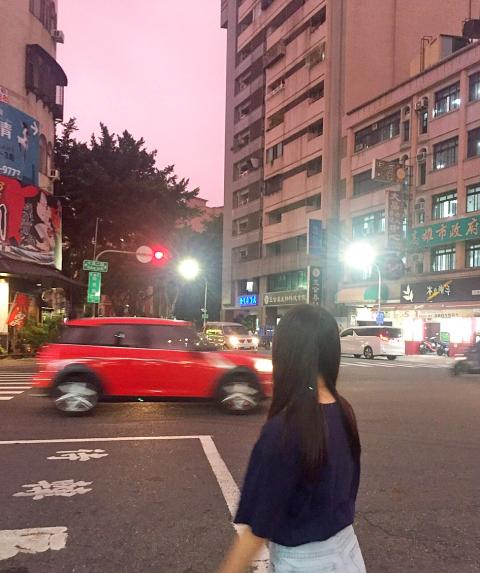An ophthalmologist warned people against using their smartphones in the dark for extended periods after a teen was diagnosed with acquired “red-green color blindness.”
Hung Chi-ting (洪啟庭), an ophthalmologist with Fooyin University Hospital in Pingtung County, on Sunday said that last month he treated a 16-year-old girl who came to him complaining about her inability to distinguish the colors of traffic light.
Hung quoted the girl, surnamed Liu (劉), as saying that after summer vacation, she had had several risky encounters when crossing the street.

Photo courtesy of Hung Chi-ting
It was only when she was out walking with her family that they noticed that she mistook the red light for green, Liu said.
She also experienced a deterioration in her ability to see in the dark, Hung said.
Whereas it used to take her about 25 minutes for her eyes to adapt and be able to distinguish things in a dark room, now it takes her about an hour, he quoted Liu as saying.
After checking her vision, Hung said that there were no signs that Liu’s nearsightedness had worsened, as it remained at 4 diopters.
Neither did she have glaucoma, cataracts, retinal detachment, hypertension, nor a family history of other rare diseases, he added.
Liu said that since the beginning of summer vacation, she had not spent a minute away from her smartphone, adding that she would turn off lights in her room and use her phone in bed, averaging about 10 hours of screen time each day.
Hung said that if rod cells (responsible for vision in low-light conditions) and cone cells (responsible for vision in bright light and color sensing) are under oxidative stress caused by long-term exposure to blue light, free radicals and reactive oxygen species — both of which attack and damage cells — would appear around the multilayer cells of the retina.
That is what causes acquired color blindness and impaired dark adaptation, Hung added.
Fortunately, Liu’s condition was in the early stage and she has stopped using her smartphone, Hung said, adding that her vision has recovered.
Congenital color blindness is untreatable, and the red-green color blindness would have deteriorated and became complete color blindness had the girl not been treated early, Hung added.
People should not use their smartphones for more than five hours a day and take 10-minute breaks every 30 minutes, he said.
Gazing at distant objects can soothe eye strain, while staring at the phone with the lights off is not recommended, as blue light damages eye cells even more in the dark, he added.

Conflict with Taiwan could leave China with “massive economic disruption, catastrophic military losses, significant social unrest, and devastating sanctions,” a US think tank said in a report released on Monday. The German Marshall Fund released a report titled If China Attacks Taiwan: The Consequences for China of “Minor Conflict” and “Major War” Scenarios. The report details the “massive” economic, military, social and international costs to China in the event of a minor conflict or major war with Taiwan, estimating that the Chinese People’s Liberation Army (PLA) could sustain losses of more than half of its active-duty ground forces, including 100,000 troops. Understanding Chinese

The Ministry of Foreign Affairs (MOFA) yesterday said it is closely monitoring developments in Venezuela, and would continue to cooperate with democratic allies and work together for regional and global security, stability, and prosperity. The remarks came after the US on Saturday launched a series of airstrikes in Venezuela and kidnapped Venezuelan President Nicolas Maduro, who was later flown to New York along with his wife. The pair face US charges related to drug trafficking and alleged cooperation with gangs designated as terrorist organizations. Maduro has denied the allegations. The ministry said that it is closely monitoring the political and economic situation

‘SLICING METHOD’: In the event of a blockade, the China Coast Guard would intercept Taiwanese ships while its navy would seek to deter foreign intervention China’s military drills around Taiwan this week signaled potential strategies to cut the nation off from energy supplies and foreign military assistance, a US think tank report said. The Chinese People’s Liberation Army (PLA) conducted what it called “Justice Mission 2025” exercises from Monday to Tuesday in five maritime zones and airspace around Taiwan, calling them a warning to “Taiwanese independence” forces. In a report released on Wednesday, the Institute for the Study of War said the exercises effectively simulated blocking shipping routes to major port cities, including Kaohsiung, Keelung and Hualien. Taiwan would be highly vulnerable under such a blockade, because it

UNRELENTING: China attempted cyberattacks on Taiwan’s critical infrastructure 2.63 million times per day last year, up from 1.23 million in 2023, the NSB said China’s cyberarmy has long engaged in cyberattacks against Taiwan’s critical infrastructure, employing diverse and evolving tactics, the National Security Bureau (NSB) said yesterday, adding that cyberattacks on critical energy infrastructure last year increased 10-fold compared with the previous year. The NSB yesterday released a report titled Analysis on China’s Cyber Threats to Taiwan’s Critical Infrastructure in 2025, outlining the number of cyberattacks, major tactics and hacker groups. Taiwan’s national intelligence community identified a large number of cybersecurity incidents last year, the bureau said in a statement. China’s cyberarmy last year launched an average of 2.63 million intrusion attempts per day targeting Taiwan’s critical